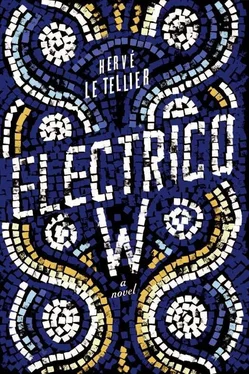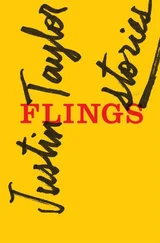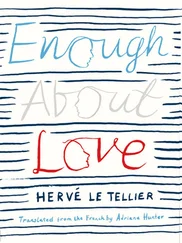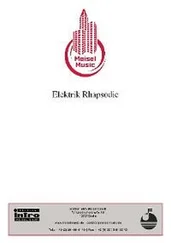“I’m really sorry about the phone. It was that girl, in Paris, the one who wrote the little note, you know.”
He sighed, drank some beer. A thought seemed to come to him suddenly.
“Actually, I think you know her,” he said. “It’s Irene.”
“Irene?”
“Yes. Such an old-fashioned name, isn’t it?”
“Which Irene? The girl in archives? Small, with curly dark hair? Pretty?”
“Worse. You see, you do know her.”
I don’t know where I found the strength not to let anything show. I walked over toward the balcony and leaned against the stone parapet, my hands came to rest flat on the limestone surface, it was cold, rough, damp. My eyes misted over for a moment. I was afraid I would betray myself, afraid to know more too, but I asked, “Why did she call you?”
“Because she’s in love with me. Or she thinks she is, which comes down to the same thing.”
“Are you — together?”
“Yes, no, I don’t know. We sleep together, that’s all.”
That’s all. Two tiny words that described their meaningless lovemaking, their nights without tomorrows. And there was I who would have been able to love her so much more, so much better. A cold anger was growing inside me, a remote loathing, nothing violent, the sort you would feel for a torturer a long way away, one whose barbarity you only learned from the terrible accounts of his victims.
I thought of Galois’s assassin, Pescheux d’Herbinville, and his murderous rage. It was not Stéphanie’s lover he had challenged to a duel, it was the living reflection of his own powerlessness to be loved. Perhaps his jealousy had also revealed a hatred for Évariste that he had not previously admitted to himself, a hatred for this unnecessarily brilliant adolescent whose intelligence and sheer life force eclipsed everything else, a hatred further fueled by the illusion of a long-standing friendship. I recognized that feeling of being nothing. It crushed me once again, this time thanks to this man and his instant and yet inexplicable charm, this man who didn’t even have to do anything to defeat me.
I kept a portrait of Galois on me, one of only a very few to have survived, an undated pencil drawing by an unknown artist. Galois’s lips were thin and yet sensual, his nosed turned up at the end, his eyes bright and almost childlike. In that penciled image he could as easily be thirteen as twenty, even though it’s not difficult to imagine he has the beginnings of a beard. The artist only had time to sketch his collar and the curve of his coat. Évariste must have posed for quite a while, before tiring. I often studied that face as if his incandescent gaze would somehow produce the words of my novel.

In the distance a man hailed a taxi in the dark. The car stopped and put on its hazard lights for a moment, and I thought that Hazard Lights would be a good title for this book or another, one day. The driver opened the door for the passenger and, with a squeal of tires, made a quick U-turn on the deserted Avenida da Liberdade. I watched the two red dots of his rear lights growing smaller, then fusing together and disappearing as the taxi turned right.
Antonio came to join me on the balcony, he looked down at the street and the square and brought his glass to his lips.
“I don’t know what to do. Really.”
He was waiting for a word from me, a sign of encouragement. On Restauradores Square a man and woman were kissing by the obscene yellow glow of streetlamps.
Antonio had no idea about our relationship. Otherwise, he would never have dared discuss Irene with me. Besides, I was sure she hadn’t talked to anyone about me, sure I had never really existed as far as she was concerned.
Antonio’s gaze roved over the city, alighting on every lurid neon sign, the red and electric blue of the Pasteleria Guzman, the red and yellow of the Splendid movie theater. He drank some more beer, the foam leaving a fold of white on his lips. For a moment I considered confessing everything to him. Telling him that because of her, every night, or almost, I left my room and walked aimlessly toward the river. Or I could throw my glass on the ground. But the least word, the least gesture would have sent me headlong into reality, and I did nothing, said nothing.
Antonio sighed and looked at my untouched beer.
“Aren’t you drinking, don’t you want it?”
I shook my head. A sense of calm settled. Over Irene and him. I didn’t want answers to any questions.
A smile hovered over his lips. Which surprised me.
“You went out last night,” he said. “I heard you.”
“Yes.”
“You’ve got someone here, haven’t you? A woman? Your sleepless nights …”
He was smiling, and I smiled too because I was so surprised by his question. Antonio had invented a mistress for me, a woman to fill my thoughts.
“Yes …,” I replied, without thinking. And perhaps to tone down the lie, I added, “If you like.”
“If I like?”
A lie. Quickly. Describe a woman, a meeting, strike the right note, watch the pauses, no hesitation about circumstances, places, times, no tripping up over words, or just the right amount. Talk about Irene too. Say enough for him to know, before he finds out, from her. I won a few seconds with a long draft of bitter beer.
“It’s someone I met in Italy, three years ago, during that Mafia bombing in Parma, you remember. She’s a painter … Well, she doesn’t make a living from it, her real job is restoring works of art. Paintings. From the nineteenth century. She’s Portuguese, she has a small apartment in Alfama, she spends two or three months a year there, in the summer. When I decided to come to Lisbon, I asked if I could rent it from her. She said that wouldn’t be possible because she’d be there herself. When I arrived here she was at the airport waiting for me, and that was it.”
I smiled again. So did Antonio.
“And what is this bellissima signora called?”
“L–Lena. Lena Palmer.”
I was so unprepared for the question that I forged a stupid name, one so close to my own that I could anticipate Antonio’s comment.
“Yes, I know, it’s weird: I met a girl called Palmer in Parma and, worse, my name’s Balmer, it’s a sort of mirror image, and if I marry her she’ll have a ridiculous name. But that’s not her name, it’s her husband’s. Don’t worry, her morals are safe, she’s in the process of a divorce.”
“Because of you …”
Go ahead, make fun of me, Antonio … Your sarcasm proved you were buying my story. I was sure you could already picture her, my Lena Palmer, far better than I could because I was busy trying to take on board each new lie. Lena Palmer. Actually, that Palmer was quite useful, there was no danger of forgetting it and giving myself away.
“Because of her husband, mostly because of him. A banker, or rather the financial director for a large industrial group, I never really grasped what he did. She married him, I don’t know, ten years ago when she was just twenty and he was thirty-three, it couldn’t work. Well … not because of the age difference, after all the man’s nearly the same age as me. But twenty’s too young to get married, wouldn’t you say?”
“Whereas now …,” he ventured with a hearty laugh, baring his teeth.
“No, no, Antonio,” I said with a smile. “Don’t go imagining things. We haven’t seen each other since Parma, you know … She’s not sure what she wants with me, no more than I am … But you see, something happened, it was nothing really, but it makes me think this relationship could work: I didn’t know she’d be at the airport, we’d agreed to meet a couple of hours later, at the Café Brasileira. In the crowds waiting at Arrivals, there was this really beautiful woman, unique in that mass of people, and my eyes were drawn to her, instant attraction. It was only a fraction of a second later that I recognized her as Lena, when she smiled at me and waved, delighted by my astonishment.”
Читать дальше













